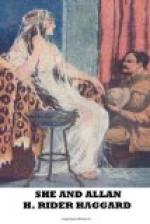“They say that his town is yonder on the plain, Baas. It is called the Place of the Axe and is strongly fortified with a river round most of it, and his people are the People of the Axe. They are a fierce people, and all the country round here is uninhabited because Umslopogaas has cleaned out the tribes who used to live in it, first with his wolves and afterwards in war. He is so strong a chief and so terrible in battle that even Chaka himself was afraid of him, and they say that he brought Dingaan the King to his end because of a quarrel about this Nada. Cetywayo, the present king, too leaves him alone and to him he pays no tribute.”
Whilst I was about to ask Hans from whom he had collected all this information, suddenly I heard sounds, and looking up, saw three tall men clad in full herald’s dress rushing towards us at great speed.
“Here come some chips from the Axe,” said Hans, and promptly bolted into the waggon.
I did not bolt because there was no time to do so without loss of dignity, but, although I wished I had my rifle with me, just sat still upon my stool and with great deliberation lighted my pipe, taking not the slightest notice of the three savage-looking fellows.
These, who I noted carried axes instead of assegais, rushed straight at me with the axes raised in such a fashion that anyone unacquainted with the habits of Zulu warriors of the old school, might have thought that they intended nothing short of murder.
As I expected, however, within about six feet of me they halted suddenly and stood there still as statues. For my part I went on lighting my pipe as though I did not see them and when at length I was obliged to lift my head, surveyed them with an air of mild interest.
Then I took a little book out of my pocket, it was my favourite copy of the Ingoldsby Legends—and began to read.
The passage which caught my eye, if “axe” be substituted for “knife” was not inappropriate. It was from “The Nurse’s Story,” and runs,
“But, oh! what
a thing ’tis to see and to know
That the bare knife
is raised in the hand of the foe,
Without hope to repel
or to ward off the blow!”
This proceeding of mine astonished them a good deal who felt that they had, so to speak, missed fire. At last the soldier in the middle said,
“Are you blind, White Man?”
“No, Black Fellow,” I answered, “but I am short-sighted. Would you be so good as to stand out of my light?” a remark which puzzled them so much that all three drew back a few paces.
When I had read a little further I came to the following lines,
“’Tis
plain,
As anatomists tell us,
that never again,
Shall life revisit the
foully slain
When once they’ve
been cut through the jugular vein.”
In my circumstances at that moment this statement seemed altogether too suggestive, so I shut up the book and remarked,




